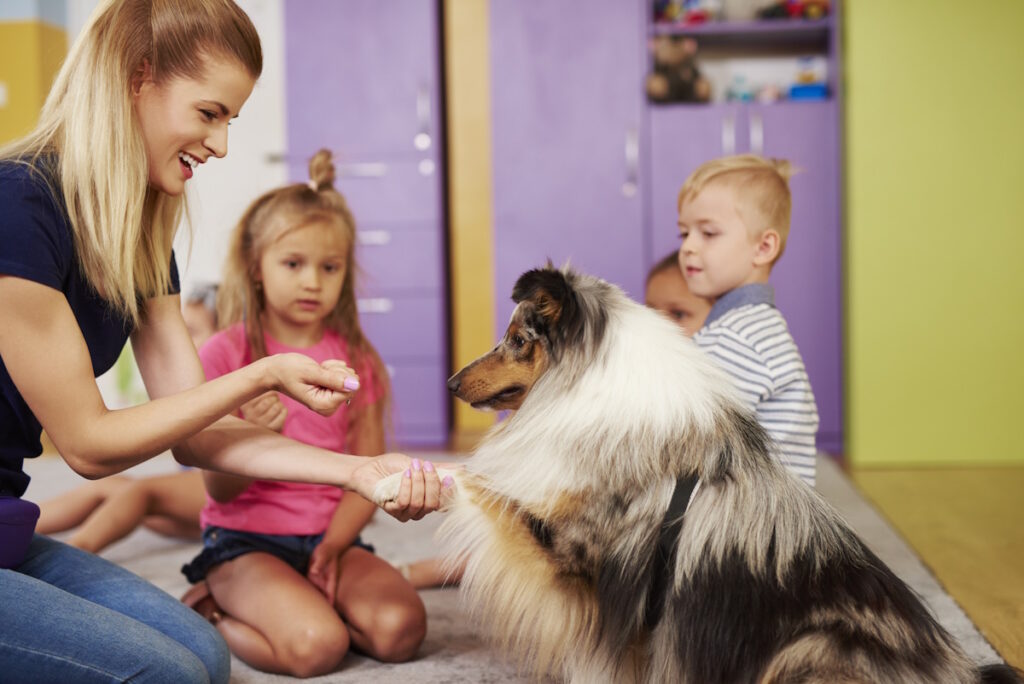Shelties are excellent family dogs, known for their friendly temperament and intelligence. They form strong bonds with children, making them ideal companions in family settings. These dogs thrive on training and socialization, and their quick learning ability makes them easy to integrate into family life. Regular exercise and mental stimulation, such as agility training, are essential to prevent behavioral issues. Be prepared for grooming needs due to their thick double coat. With a lifespan of 12 to 14 years, they require a long-term commitment, including regular veterinary care. Investigate health and temperament indicators for a harmonious family environment.
Sheltie Temperament and Characteristics
When considering a family pet, Shetland Sheepdogs, or Shelties, often stand out for their friendly and intelligent nature. As a family dog, a Sheltie offers a warm temperament that thrives on companionship and interaction. Their intelligence and enthusiasm to please make them quick learners, perfect for families willing to invest time in training and socialization. Shelties are known for their gentle nature and generally peaceful demeanor towards strangers and other animals, which makes them a great fit for family environments. Shelties need regular exercise and mental stimulation to stay content. They might develop behavioral issues without it, so daily exercise is essential. A Sheltie’s herding instincts sometimes lead to nipping, especially during high-energy situations, making supervision vital. While their friendly demeanor is a big draw, their tendency for barking can be overwhelming. These “over the top barkers” require consistent training to manage their vocal nature effectively. Socialization from an early age helps Shelties become well-rounded and adaptable to various environments. Each Sheltie has a unique personality; some might be outgoing and friendly, while others could be more reserved, especially around strangers. Understanding and respecting these traits will foster a harmonious home environment. With patience and dedication, a Sheltie can be a wonderful addition to your family, offering loyalty and companionship.
🐾 Read More: The Ultimate Shetland Sheepdog Training Guide: Tips for Raising a Well-Mannered Sheltie
Interaction With Children
A Sheltie’s wagging tail and bright eyes often signal genuine affection for children, making them delightful companions in a family setting. These dogs naturally exhibit a friendly temperament, often forming strong bonds with children when socialized early. Their gentle nature makes them well-suited for families, though their herding instincts, similar to those of Collie dogs, can lead to playful chasing behaviors. This playful trait, while endearing, means supervision is essential during playtime with running children to guarantee safety for both the Sheltie and the kids.
Shelties thrive on positive interactions, which improve their compatibility with children. Early socialization plays a significant role in shaping their behavior and guaranteeing harmonious interactions within the family. However, individual temperaments can vary. Some Shelties may display timid behavior, particularly around young or energetic children. Gradual introductions are important, allowing the dog to become comfortable and confident in its new environment.
Observing your Sheltie’s personality and understanding its unique temperament will help foster a positive relationship between the dog and your children. With the right socialization and supervision, Shelties can become beloved family members, offering affection and companionship to children of all ages.

Exercise and Activity Needs
Shelties thrive when they get plenty of exercise, so don’t skip their daily walks. They require at least 60 minutes of daily exercise to maintain both physical health and mental stimulation. This routine helps prevent boredom, which can lead to undesirable behaviors. Like Border Collies, Shelties also benefit from engaging in activities such as fetching, agility training, or even farm chores, making them ideal companions for active families. Their playful nature means they enjoy these tasks; consistent exercise keeps them happy and fulfilled.
Moderate exercise, such as walking or chasing balls, suits them well, provided it’s consistent. You don’t need to be an athlete to meet their activity needs, but being part of an active household helps. Shelties have high energy levels and thrive in environments where they can constructively expend this energy. In particular, agility training provides physical and mental challenges that keep their minds sharp and bodies fit.
Interactive play and tasks are beneficial for their mental stimulation. This approach not only keeps them engaged but also strengthens your bond with them, making them feel as a true member of the family. Cherish their lively spirit, and you’ll find a loyal, energetic companion.
🐾 Read More: Sheltie Grooming 101: Expert Tips to Keep Your Shetland Sheepdog’s Coat in Top Shape
Grooming Requirements
With their beautiful, thick double coat, Shelties require regular grooming to keep their fur in top condition. As a Shetland Sheepdog owner, you must commit to at least one hour of weekly grooming to prevent matting and manage shedding. Regular brushing, ideally every few days, is vital. This maintenance keeps the coat healthy and reduces excessive shedding in your home, guaranteeing both your and your Sheltie’s comfort.
You’ll want to invest in specialized grooming tools to manage their dense fur effectively. Deep de-shedding combs and slicker brushes are recommended to tackle the thick undercoat typical of Shetland Sheepdogs. Neglecting grooming can increase shedding and discomfort for your Sheltie, so routine maintenance is significant.
While regular brushing is fundamental, bathing should be occasional. Over-bathing can damage the coat’s quality, so it’s best to bathe your Sheltie only when necessary. Maintaining a consistent grooming routine guarantees your Sheltie’s coat remains vibrant and healthy. This improves their appearance and contributes to their overall health and well-being, making them a happy and essential part of your family.

Health and Lifespan
When considering Shetland Sheepdogs as family pets, understanding their health and lifespan is vital. Shelties can be a part of your family, making them a long-term companion. To guarantee they remain healthy, be aware of common health issues such as hip dysplasia, Collie eye anomaly, and hypothyroidism. These conditions can affect your Sheltie’s overall well-being, so it’s important to remain vigilant.
Regular veterinary care is essential for your Sheltie’s longevity. Routine check-ups, vaccinations, and health screenings help detect genetic disorders early and maintain their health over the years. Genetic testing is another valuable tool, identifying susceptibility to over 210 health conditions, which aids in preventive care and provides peace of mind.
A balanced diet, consistent exercise, and mental stimulation are crucial to promoting your Sheltie’s health and longevity. Proper nutrition supports their physical well-being, while regular exercise keeps them fit and active. Mental stimulation, through activities such as training and puzzles, keeps their minds sharp, guaranteeing they thrive as family dogs. Addressing these aspects will foster a healthy environment where your Sheltie flourishes, becoming an integral part of your family.
🐾 Read More: Understanding Sheltie Barking: Why They Bark and How to Manage It
Finding the Right Sheltie
After understanding the health and lifespan of Shelties, the next step is finding the right one for your family. When searching for a Shetland Sheepdog, explore reputable rescues or breeders. They prioritize health and temperament, guaranteeing you bring home a well-adjusted pet. Early socialization is crucial; select a Sheltie exposed to diverse environments, people, and experiences. This reduces timid behavior and curbs excessive barking, making your home environment more harmonious.
Consider each Sheltie’s individual temperament. Some dogs are more extroverted and adapt well to busy family interactions, while others prefer quieter settings. A gentle demeanor, especially around children, indicates good compatibility within a family environment. Before deciding, observe how the Sheltie interacts in various scenarios, since this can offer insights into its suitability for your household.
Be prepared for a Sheltie’s vocal nature. Training and consistent boundaries are vital to manage barking tendencies effectively. Patience and structured training will guarantee your Sheltie becomes a cherished family member. With thoughtful consideration and preparation, you’ll find the perfect Sheltie that fits seamlessly into your life.

Conclusion
Ultimately, Shelties make excellent family dogs, blending intelligence, loyalty, and a playful spirit. Picture them dashing through the yard, their expressive eyes shining joyfully while interacting with children. With regular exercise and some grooming, they thrive in a loving home. Their health is generally robust, rewarding you with years of companionship. Consider your lifestyle and needs while you search for the perfect Sheltie, ensuring a match that enriches your family’s life.